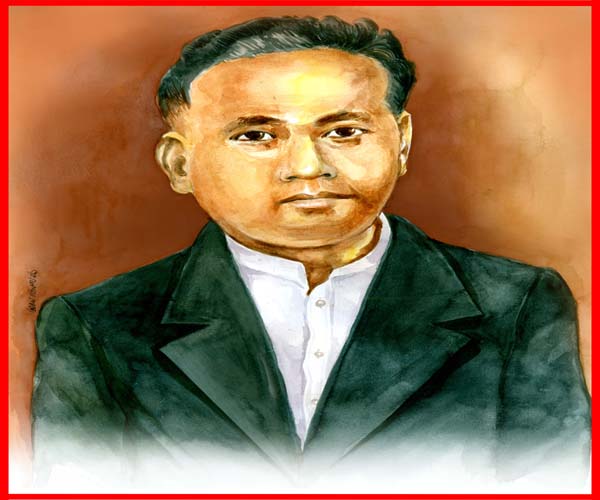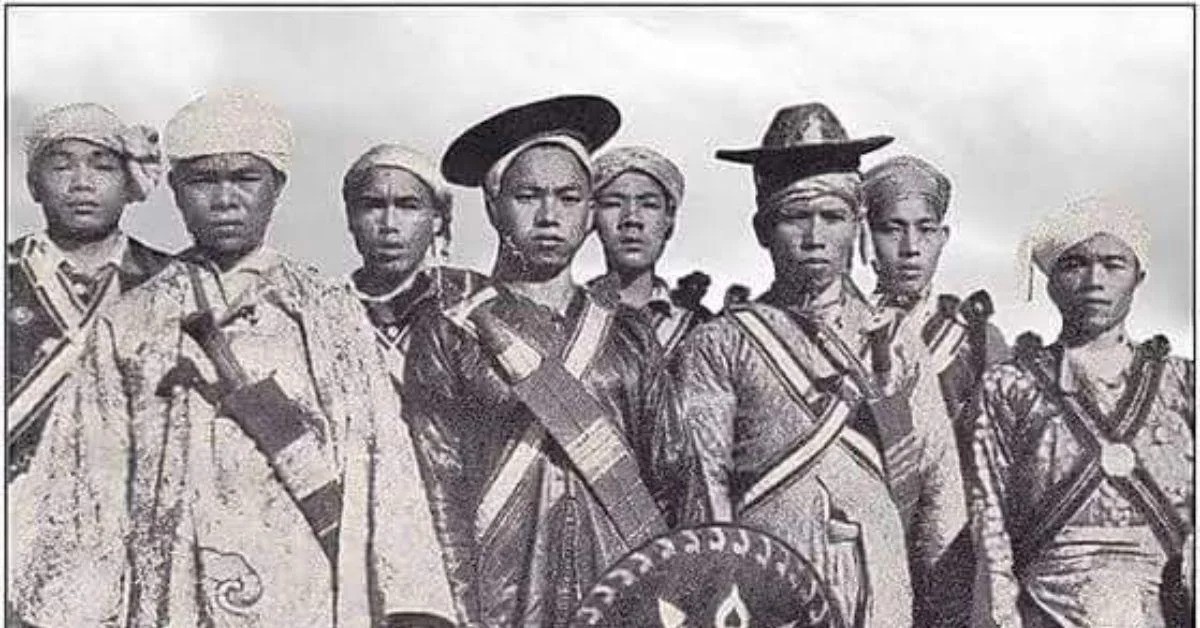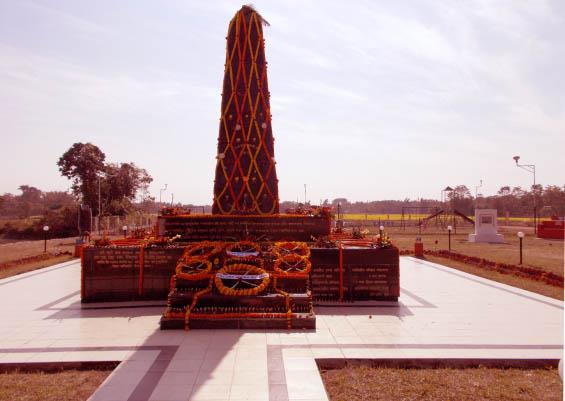Dr Anil Bharali
“Who controls the past, controls the future. Who controls
the present, controls the past.” – George Orwell
The year 1942. With the beginning of the Second World War, the Indian National Movement for freedom was at its peak. As part of the axis powers, Japan in 1941 was able to make further advancements in an abrupt manner into South East Asia. The country had been able to capture Singapore and later reach the easternmost corners of British India, after capturing Rangoon, the capital of British Burma. In the subsequent period, it brought some bordering areas of Nagaland and Manipur under its control in 1944 with the help of the Azad Hind Fauj led by Colonel Mallik. Brave soldiers of the Azad Hind Fauj hoisted the flag of independent India in Moirang, Manipur, for the first time on Indian soil and made announcement of forming a government of the Hind Fauj. Mentionable that the Fauj government was given recognition by several countries immediately. It was that time when Bose referred to Mahatma Gandhi as the father of the Nation. Prior to that in 1942, the then viceroy of Lord Linlithgow declared the unilateral decision of India’s entry into the ongoing world war on behalf of the Allied Forces, without consulting in ruling political parties. In opposition to this, the Congress stepped out of the ruling government. On the other hand, the minority party the Muslim League took it as an opportunity to form their government by extending support to the British government. Likewise, during that time in Assam, the Congress led by Gopinath Bordoloi formed a coalition government with the Tribal League. However, under pressure from its central committee, the congress dismissed the government. Importantly, Subhash Chandra Bose, the then President of the Congress Party had played significant role in the formation of the government led by Bordoloi.
In the course of time, when the Second World War was in full swing in South East Asia, British government had to lose first Singapore and then Burma to the lightening attack launched by the Japanese Army. As a result and under constant pressure from China and the US, then UK Prime Minister Winston Churchill sent Stafford Cripps to secure ‘anti-war’ India’s cooperation and support to their efforts in the World War by offering a discussion on the British government’s draft declaration on the constitution of India. But Churchill was not considerate to the idea of an independent India which is evident from his famous statement, “I have not become the King’s First Minister in order to preside at the liquidation of the British Empire”.
On December 7, 1941, a surprise air strike of the Japanese air force wreaked havoc on the US naval base at Pearl Harbour following which on 8th December, the next day, US President Roosevelt gave his famous ‘day of infamy’ speech at the US congress. This unprovoked attack solidified public opinion across the length and breadth of Japan against the empire of Japan. After two weeks of this attack, Winston Churchill arrived at the White House at night on a secret voyage to visit the US President. Interestingly the First Lady of US Eleanor Roosevelt was not aware of this important visit by Churchill and was annoyed at times. Prime Minister Churchill stayed at the white house as guest for three weeks and during this time the United Nations was formed with support from 150 countries.
Four months prior to that, President Roosevelt and Prime Minister Churchill drafted the Atlantic Charter that set out goals for their countries after the end of the World War and it was in that charter that they made restoration of self-governance to those deprived of it, one of the goals. However, it was not possible to move American public opinion in favour of the war prior to the Pearl Harbour Attack.
Germany’s defeat at the hands of the allied forces in 1938 rendered incomplete. Therefore it was envisioned in the charter to work out a complete destruction of Nazi Germany. An article published in the American Legion magazine noted,
“President Roosevelt (FDR) and Churchill was ensured that post war peace shaped by Atlantic Charter would tear down the barriers to trade, development and economic activity. If isolation, i.e., economic nationalism and closed off markets helped sow the seeds of war, they reasoned, then free trade, access to raw materials, freedom of the seas and a more liberal economic system would characterise the post war world. One of the pre-conditions of any lasting peace will have to be the greatest possible freedom of trade”.
Further it was stated in the treaty that no territorial changes that do not accord with the freely expressed wishes of the peoples concerned and endorsed the right of all people to choose government under which they live……. These war aims gave allies something to fight for: a better world, in the words of charter, a freer, more just world.
Despite agreeing to fulfil the aims laid down in the Atlantic Charter, Churchill observed regarding grant of independence to countries in South East Asia, especially India, “I have not become the King’s First Minister to preside at the liquidation of the British Empire.” With the capture of Singapore by enemy forces, the US, USSR and China started putting pressure on the British Government to draw support from Indians in favour of the war. Accordingly, a delegation led by Stafford Cripps, a leader of the labour party, was sent by Prime Minister Churchill.
The aim of this Cripps mission was to secure support from Indians in favour of the British Government in the World War, in exchange of a draft resolution for constitution of India after the end of the war. Moreover, it said that Muslims and other minority communities would be offered to form independent states separate from India. Jinnah’s observation regarding the Cripps Mission was ‘Jinnah and the Muslims, to whom Cripps had offered the right to opt out a future union, supported the war effort and gained in status in British eyes. Jinnah was surprised to see that the right to opt out a future union was undertaken.
Initially, the Muslim League accepted the assurance given by the Cripps Mission but towards later period, they declined the same by stating that it was not a solid assurance. Similarly like the Muslim league, the Indian National Congress and other political forces declined the Cripps Mission due to their respective reasons. Mahatma Gandhi declined to accept the mission’s proposal by terming it an ‘outdated cheque’ and called for Quit India Movement. Subsequently, all prominent leaders as well as active workers of the congress were arrested by the British Government. Mentionable that gross root workers of the RSS and even the communists also stood against the war.
Through subtle techniques backed by imperialistic principles, the British were able to cast aside Mahatma Gandhi and since then Gandhi remained side lined in all further political developments including the transfer of power to India.
The Congress was divided upon its response of India’s entry into World War II. Angry over the decision made by Viceroy, some congress leaders favoured launching a revolt against the British Empire, despite the gravity of the war in Europe which threatened Britain’s own freedom. Others such as Chakrabotry Rajagopalachary advocated offering an olive branch to the supporting in the crucial time in the hope that the gesture would be reciprocated with independence after the war. The major leader Mahatma Gandhi was opposed to Indian involvement in the war as he would not morally endorse a war and also suspected the British intensions, believing that the British were not sincere about Indian aspiration for Independence. But Rajagopalachari, backed by Sardar Patel, Maulana Azad and Jawaharlal Nehru held talks with Cripps and offered support in return for immediate self-Government and eventual independence.
Reason behind the failure of the Cripps Mission was the two-faced stance that Churchill adopted. The British Viceroy in India, Lord Linlithgow, was a close ally of Churchill and personally convinced that no further concessions to Congress were necessary during the war. In his eyes, the only thing that mattered was to maintain the British status quo. Therefore, when he first come to read a copy of the Draft Declaration, he immediately offered his resignation in protest, which put Churchill in an embarrassing situation. (Marty, Simons. Churchill’s double game with Cripps Mission to India)
It was a demonstration of how intern a politics of Britain affected the political scenario of India. By that time, Lord Wavel became the Governor General of India and he was supported by the Labour Party of Britain. On the other hand Lord Linlithgow was a conservative Party leader. It is also said that Winston Churchill thought of Stafford Cripps as a potential prime ministerial candidate for 1945 and therefore he tried to downgrade his political standing by making the mission a failure.
During that time, the Tribal League led by Bhimbor Deori was part of the coalition government of the Congress formed by Gopinath Bordoloi. Stafford Cripps travelled across states and held discussions with various regional and national political parties.
Regarding Bhimbor Deori’s discussion with Cripps, brotherly Shri Tankeswar Deori wrote, “It was the year 1942. Cabinet or Cripps Mission came to India.(It is also known as one-man mission) The Mission arrived Assam after travelling the length and breadth of the country. Like other political parties the representatives of the Tribal League submitted memorandum to the mission. The group of representatives was led by Bhimbor Deori. After few moments of discussion, Cripps said that the Ahoms too are not indigenous in Assam. They are from Burma. We are English as we come from England. Now that makes both the Ahoms and us foreigners. Then how come you have embraced them, not us? The Ahoms came from Burma and established their reign by defeating you. We also have defeated you after coming from England. At this point, how are we different from the Ahoms to you? To his questions Deori answered, “Yes, it is true that the Ahoms have come from Burma and they are not indigenous peoples. They have also defeated us and later ruled the Assam. And we have accepted the Ahoms and asked you to leave our country. This is also truth. Because, the Ahoms not only ruled us by merely winning wars, but also got assimilated with us completely, abandoning their own language, culture, religion, attire and accepted ours as their own. Therefore we have been able to accept them. On the other hand, you have not only ruled us by winning wars, but also exploited us in the worst possible manner. If you try to be like us, we will for sure embrace you too.”
This note by Tankeswar Deori is a treasure for the history of Assam. It can be assumed that Deori’s Political expertise and diplomatic insights were able to pose a challenge to the British. Perhaps due to this only, labour party supported new viceroy of India lord Wavel came to know about Deori’s logical approach backed by historical and moral insights during a discussion with the latter, who was also the Forest Minister, about royalty on timber. Jinnah also saw Deori’s expertise during a meeting about Assam in connection with the grouping policy. Jinnah who is also a renowned lawyer and proponent of the ‘Direct Action’ did away with his political agenda of inclusion of Assam into Pakistan as part of the Grouping policy, avoiding violence. Thus the doors to remain with India opened for Assam in a peaceful manner without resorting to roadside protests and demonstrations.
In view of the global political developments during the Second World War, a memorandum was submitted to the US President Roosevelt in 1943 by former chief minister of Assam Jogen Hazarika on behalf of the Tribal League through the US the embassy in Delhi, regarding local tribal / indigenous rights and other issues of Assam.
Through the 1941 census, it was possible to figure out the tribal population in Assam and the North East as well. And this paved the way for formulation of sixth schedule in the Indian Constitution which in turn opened the doors for creation of reservation on the basis of population for STs. This census, which is the result of sincere efforts of Bhimbor Deori, helped in the institution of India as a Democratic Republic in the constitution. Bhimbor Deori was well conversant with important issues of Global politics of that time including that of the British Empire.
Had Churchill not lose the general election of Britain in 1945, many Indian states would have continued as British colonies as planned by him.
Under the same plans Churchil also envisioned to create new states as Crown Colonies. Bhimbor Deori was bold enough to speak against the Britain’s policy of imperialism, which is at the root of many other problems including the secessionist activities in Nagaland.
It is sad that there is hardly any sincere or serious efforts to study or discuss the initiatives taken and the sacrifices made by Bhimbor Deori amongst the academic circle of Assam in particular and the country in general.






